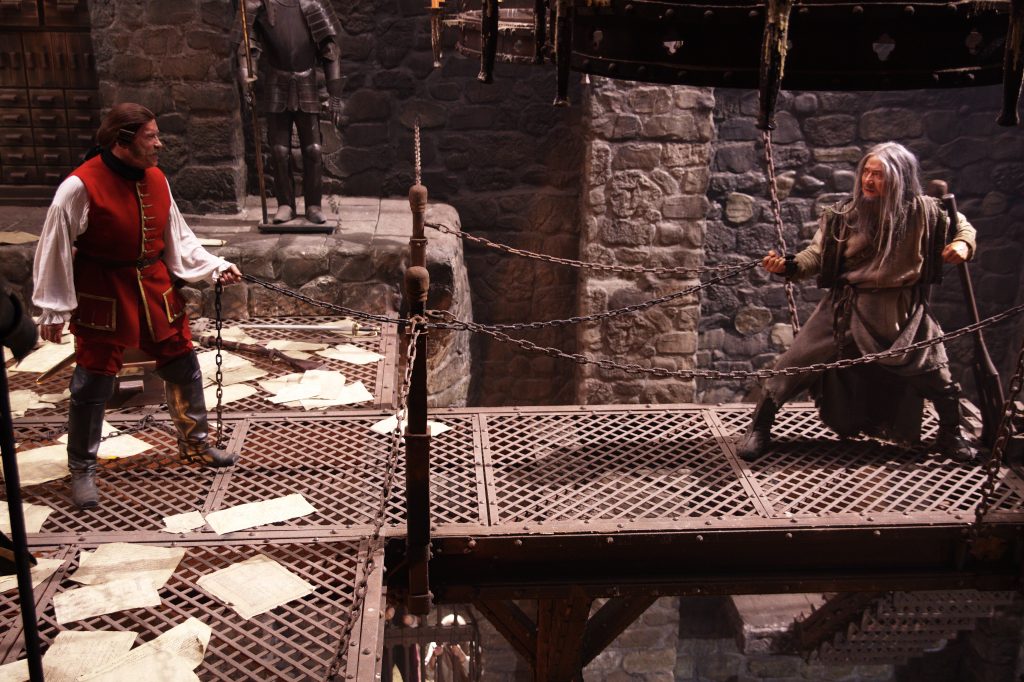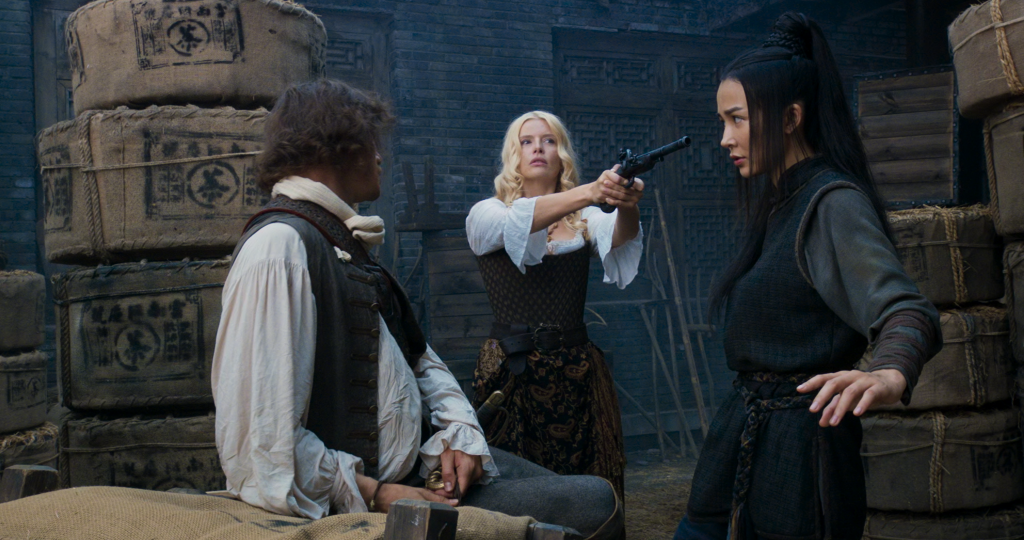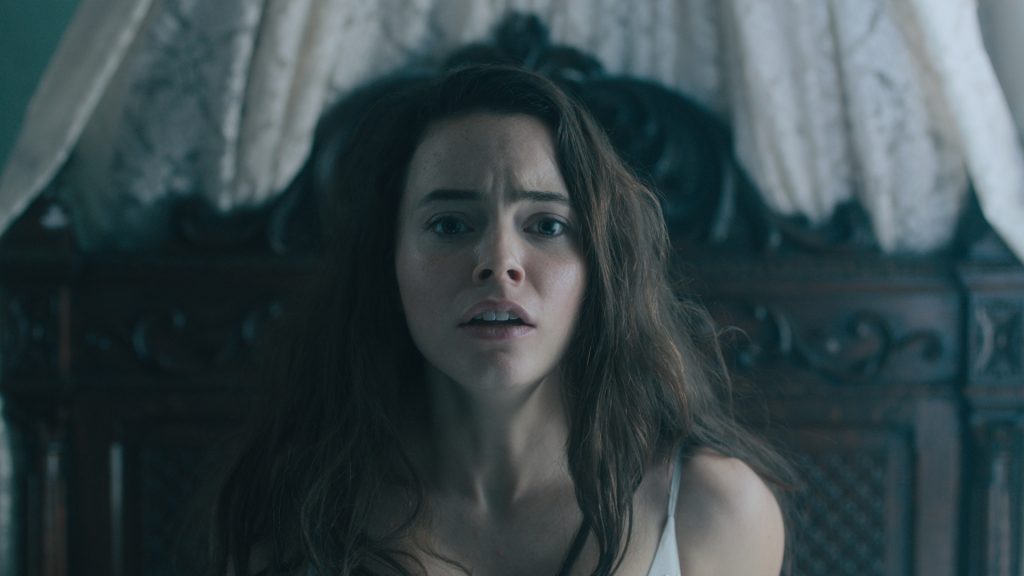January 16, 2021
by Carla Hay

Directed by Oleg Stepchenko
Culture Representation: Taking place in England, Russia and China, the action-adventure film “Iron Mask” has a cast of white people and Asians representing the working-class, royalty and the criminal underground.
Culture Clash: An adventurer teams up with a princess disguised as a teenage boy to rescue the princess’ imprisoned father and save a magical dragon that has been taken over by an evil witch and her group of wizards.
Culture Audience: “Iron Mask” will appeal primarily to people who don’t mind watching nonsensical and poorly acted action flicks.

“Iron Mask” is one of those movies that’s so horrendous, it’s like an insulting parody of a bad movie. “Iron Mask” (sloppily directed by Oleg Stepchenko, who co-wrote the insipid screenplay with Alexey A. Petrukhin) looks like it has a budget that was spent mostly on the production design (some of the set designs are fairly elaborate); the often-tacky visual effects; and the salaries of Arnold Schwarzenegger and Jackie Chan, who get top billing. However, these two past-their-prime action stars are each in “Iron Mask” for less than 20 minutes of this two-hour muddled mess of a film. That skimpy screen time should be enough of an indication how much of a shameless ripoff “Iron Mask” is to mislead viewers into thinking that Schwarzenegger and Chan are the central characters in the movie. They’re not.
In reality, “Iron Mask” is a bloated slog of terrible acting and time-wasting scenes where there are pointless fights that all lead to a predictable and very cheesy ending. It’s the kind of dreck that, if people have the patience to watch the whole thing without falling asleep, they’ll forget almost everything about the movie not long after watching it. It’s not only mind-numbingly bad, but it’s also very boring.
You know how movies look where people speak in another language but their voices are overdubbed with another language? “Iron Mask” (whose convoluted story takes place mostly in England, Russia and China) is that type of movie. It has an international cast, and there are scenes where it’s obvious that people spoke another language when filming the movie but then it was overdubbed in English for release in English-speaking countries. The weird thing is that the audio doesn’t quite synch up well throughout the entire movie, so it looks like even the actors who speak English have overdubbing. That’s how carelessly the film was made.
“Iron Mask” was previously titled “The Mystery of the Dragon Seal,” which is a more appealing title, but it still doesn’t change how badly this movie was made. Here’s the gist of the plot, as it’s explained in the beginning of the film with voiceover narration that’s supposed to sound mystical: In a land far, far away, there lived a creature called the Great Dragon, whose eyelashes went deep into the ground and came up as plants that were made into tea. (Try not to laugh at the ludicrousness of this concept.) The land where the dragon lives is supposed to be an alternate fantasy version of China.
Humans called white wizards were entrusted with the tea. The dragon has a special white seal, which the dragon gave to two white wizards whom the dragon trusted the most: a man named Master (played by Chan) and his princess daughter named Cheng Lan (played by Xingtong Yao). But since movies like this need villains, it’s explained that some of the wizards got greedy, went to the dark side, and called themselves black wizards. These black wizards aligned with an evil witch (played by Li Ma), who led them in an army that took control of the dragon so they could steal all the tea and sell it for their own financial gain.
The witch and the black wizards stopped trimming the dragon’s eyelashes, so the dragon’s eyes became too heavy, and the dragon fell into a deep sleep. The white wizards fought to free the dragon, but they were defeated by the black wizards. As a result, Master and his daughter Cheng Lan were imprisoned on opposite sides of Europe.
Master ends up in the Tower Grey Prison in England, while Cheng Lan ends up in a prison in Russia. Schwarzenegger’s role in the film is a little out-of-place and bizarre. He plays James Hook (as in pirate Captain James Hook, albeit with Schwarzenegger’s heavy German accent), who acts as a prison warden for the Tower Grey Prison, but he’s decked out the whole time in a red and white pirate suit. It’s as ridiculous as it sounds.
Meanwhile, the story’s main character is a Brit named Jonathan Green (played by Jason Flemyng), who is shown being chased off the estate of a nobleman called Lord Dudley (played by Charles Dance), who is very upset with Jonathan. Why? Because Lord Dudley doesn’t want Jonathan to be with his daughter Miss Dudley (played by Anna Churina), a somewhat prissy heiress who’s in love with Jonathan.
The movie doesn’t make it clear if Miss Dudley and Jonathan are married or not. The “miss” title in her name implies that she’s not married, but then later in the movie, she refers to Jonathan as her “husband.” Whatever their marital status, Jonathan and Miss Dudley have a son together, who’s about 4 or 5 years old, so Lord Dudley can’t get rid of Jonathan that easily.
After being banished from the Dudley estate, Jonathan travels to Russia, where he saw an ancient creature with countless eyes called Viy, which has the ability to read minds. There are also Russians called Cossacks who can turn into creatures. It’s just an excuse to pile on some visual effects that don’t do much to improve this poorly written story.
Jonathan ends up in a Russian prison, and there’s a silly plot development involving a messenger pigeon that leads to Jonathan taking it upon himself to rescuing Master and Cheng Lan; saving the Great Dragon; defeating the villains led by the witch; and going back to England to reunite with Miss Dudley and their son so they can all live happily ever after. Jonathan is released from the prison by Peter the Great, also known as Iron Mask (played by Yuri Kolokolnikov), who’s kind of a useless and annoying character, even though the movie’s title was named for him. Rutger Hauer (who died in 2019) has a much smaller and forgettable role as an ambassador character.
As you can imagine, this loopy saga involves a lot of globetrotting, and there are huge portions of the film that take place on a pirate ship (cue the swashbuckling) and on battle fields. And presumably to appeal to kids, the movie has a creature that looks like a cute blue stuffed toy monkey with wings. This CGI-created creature tags along with Jonathan when he goes to rescue Cheng Lan while they travel by carriage and are confronted by a gang of thieves.
For her protection, Cheng Lan has disguised herself as a teenage boy. It’s not a convincing disguise, but she manages to fool Jonathan for most of the story anyway. Miss Dudley hears that Jonathan has gone to rescue a beautiful princess, and she gets jealous. So there’s a dumb subplot of Miss Dudley flouncing off to Russia to try to track down her man.
Miss Dudley ends up disguising herself briefly as a male pirate to get on board a ship that’s bound for China. Just like Cheng Lan, Miss Dudley also looks very unconvincing “disguised” as someone of the opposite sex. The movie can’t even get it right when it dresses up women up in drag. Whatever this fantasy world is in “Iron Mask,” it’s clear that it’s a world where the “good” women aren’t taken seriously as men are taken seriously, when it comes to being strong leaders and fighters, so the women have to disguise themselves as men to get things done. However, the movie has no problem making the chief villain a woman who doesn’t disguise herself as a man.
There’s also some underlying sexism when James Hook comments on an elderly man who died in the Tower Grey Prison: “At least he died happy,” and adds an explanation for why this man died happy: “As far as I know, he hasn’t seen a woman in 30 years.”
James Hook and Master have an inevitable fight scene where there’s more crappy dialogue that’s fails miserably at being funny. While the two adversaries are fighting with swords, James Hook’s hair gets cut off, while Master’s long beard gets shortened. Master tells Hook, “You look better this way.” Hook comments to Master on his new look: “You look younger.” Master replies, “Do I?” And then they resume fighting.
Cheesy jokes aside, “Iron Mask” looks like a movie made by people who wanted to waste millions in production money to make a live-action version of a very badly conceived cartoon. The characters are bland and unappealing. And the actors seem to know it too, because there’s no real enthusiasm or sincerity in their performances. And the amateurish direction gives the impression that a robot could’ve done a better job directing this movie. There are bad movies that are sometimes fun to watch, but “Iron Mask” is just a cringeworthy chore to watch.
Lionsgate released “Iron Mask” on digital and VOD on November 20, 2020, and on Blu-ray and DVD on November 24, 2020.


